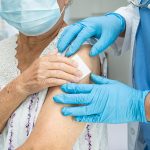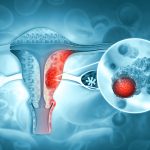-
April 21: The Week in Cancer News
Awareness of HPV link to cancer has declined, and more frequent COVID-19 boosters authorized for people who are immunocompromised.
by Eric Fitzsimmons
-
Nudging Our Way to Better Cancer Care
Researchers use insights from behavioral economics to encourage taking recommended actions in health care.
by Kevin McLaughlin
-
Post-surgery Option for Liver Cancer
New study finds drug combination after surgery helps prevent recurrence in liver cancer patients.
by Thomas Celona
-
Chronic Stress and Cancer
Accumulating research shows lifelong stressors degrade health and increase cancer risk, but exercise might help counteract the impact of stress.
by Thomas Celona
-
Forward Look
Progress in Personalized Cancer VaccinesStudy finds mRNA vaccine can help prevent cancer recurrence in advanced melanoma patients.
by Thomas Celona
-
April 14: The Week in Cancer News
Treatment vaccines are on the horizon, and immunotherapy drugs are effective in treating multiple myeloma.
by Kevin McLaughlin
-
Preventable Emergency Department Visits Trending Upwards for Patients with Cancer
Attentive care can manage conditions that cause patients to seek emergency care, but patients with concerning symptoms should still go to the hospital or urgent care center.
by Sandra Gordon
-
April 7: The Week in Cancer News
New therapy approved for locally advanced or metastatic bladder cancer, and court ruling could lead to cost hikes for certain cancer screenings.
by Thomas Celona
-
Most Cancer Doctors, Patients Interested in Integrative Care
A nationwide survey found strong support for complementary therapies like massage and meditation, but also significant barriers to access.
by Kyle Bagenstose
-
March 31: The Week in Cancer News
Immunotherapies poised to change care in advanced endometrial cancer, and the end of pandemic protection expected to result in loss of health coverage for 15 million people.
by Eric Fitzsimmons
Cancer Talk
Many People Don’t Get Colonoscopy After Receiving Abnormal Blood Tests
About half of people who receive abnormal results from colorectal cancer screening tests don’t follow up with a colonoscopy.
by Laura Gesualdi Gilmore
Can Steroids Impair Immunotherapy for Cancer?A new study suggests steroids could blunt the effects of some immunotherapies, but researchers say they remain necessary for some patients.
by Kyle Bagenstose
Treatment Combination Improves Survival in Platinum-resistant Ovarian CancerPreliminary results found that combining relacorilant with nab-paclitaxel improved outcomes for women with advanced ovarian cancer.
by Sandra Gordon
CAR T-cell Therapy Shows Response in Rare Brain CancerPotential new approach to treating diffuse intrinsic pontine glioma uses engineered immune cells infused directly to the brain.
by Taneia Surles














